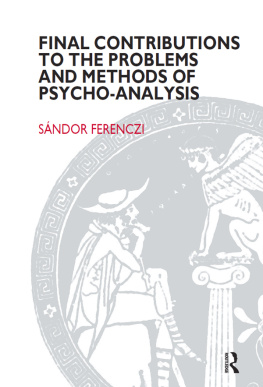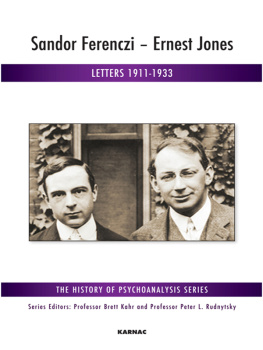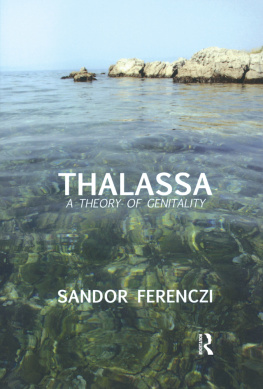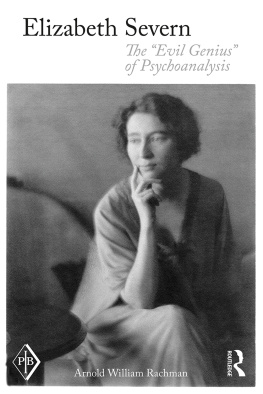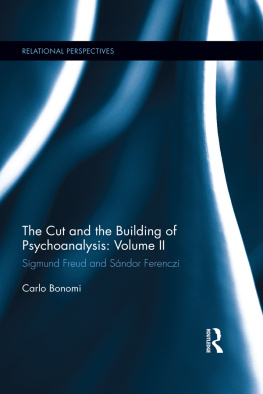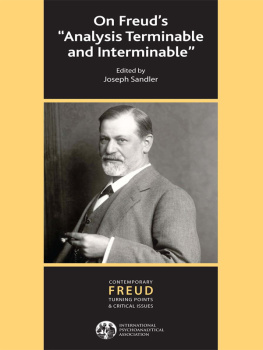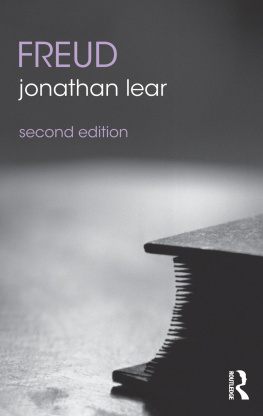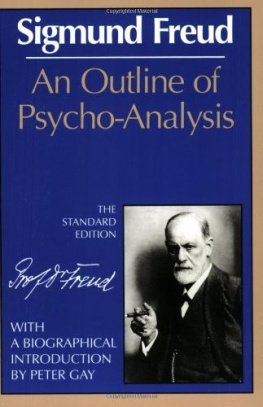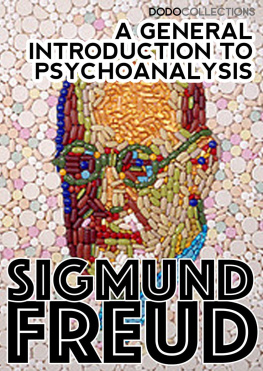
Final Contributions to the
Problems and Methods
of Psycho-Analysis
FINAL CONTRIBUTIONS
TO THE
PROBLEMS AND METHODS
OF PSYCHO-ANALYSIS
BY
SNDOR FERENCZI
Edited by
MICHAEL BALINT
Translated by
Eric Mosbacher and others

Published 1994 by Karnac Books Ltd.
Published 2018 by Routledge
2 Park Square, Milton Park, Abingdon, Oxon OX14 4RN
52 Vanderbilt Avenue, New York, NY 10017, USA
Routledge is an imprint of the Taylor & Francis Group, an informa business
Copyright Judith Dupont 1955
All rights reserved. No part of this book may be reprinted or reproduced or utilised in any form or by any electronic, mechanical, or other means, now known or hereafter invented, including photocopying and recording, or in any information storage or retrieval system, without permission in writing from the publishers.
Notice:
Product or corporate names may be trademarks or registered trademarks, and are used only for identification and explanation without intent to infringe.
British Library Cataloguing in Publication Data
A C.I.P. for this book is available from the British Library
ISBN 9781855750876 (pbk)
THE appearance of this volume gives English readers the first opportunity of critically appreciating the development of Ferenczis ideas, as his papers written after 1926, i.e. since the publication of Further Contributions, were either scattered in various scientific journals, as often as not in inadequate translations, or had not been translated at all. In the period 192633 he produced, it is true, some of his rather problematic writings, but also several of his most stimulating ones. In this respect German readers were in a far better position as the publication of the four volumes of Bausteine zur Psychoanalyse, in 1939, made practically all his papers easily accessible. This volume has been compiled with the aim of remedying this state of affairs.
The papers here collected fall into three well-defined groups: (a) papers written after Further Contributions, (b) posthumous papers, notes and fragments, and (c) papers whichvery likely owing to an oversightwere omitted from Further Contributions, The papers in each group are arranged in chronological order.
With the publication of this volume all Ferenczis important papers are now available for English readers in book form, either (1) in the three uniform volumes: First Contributions (title of the American edition: Sex and Psycho-Analysis), Further Contributions, and the present one; or (2) in the following independent publications: (a) Thalassa (The Psychoanalytic Quarterly, New York, 2nd impr., 1938) (b) (written in collaboration with K. Abraham, E. Simmel, and E. Jones) Psycho-Analysis of the War Neuroses (Int. Psycho-Analytical Press, London, 1921) and (c) (written in collaboration with Otto Rank) The Development of Psycho-Analysis (Nervous and Mental Diseases Publication Co., New York, 1925).
The work that has been omitted comprises: papers of his pre-analytic period, papers of only local (Hungarian) interest, book reviews, polemics, and a few rather popular essays. Apart from these, there remain unpublished for the time being the complete correspondence between Freud and Ferenczi covering a period of twenty-five years, and his scientific diary, written during his last year.
A complete bibliography was published in Bausteine, Vol. IV (1939) and subsequently in the second edition of Further Contributions (1950). The bibliography in this volume enumerates in chronological order all Ferenczis papers published in English, giving in each case the volume and page numbers where the paper may be found. It has been compiled by Miss Marie de Lepervanche, the Librarian of the Institute of Psycho-Analysis, London, and I wish to record my grateful appreciation of her conscientious labours.
The index covers the same field as the bibliography, i.e. all books and papers by Ferenczi published in English. It has been prepared by Mrs. Lilla Vszy-Wagner, Ph.D., and I desire to express my thanks for her painstaking and careful work.
Papers Nos. 1, 2, 4, 5, 6, 9, 10, 11 and 12 were first published in various journals, and it has not been possible to trace their translators (some of them needed considerable revision); Nos. 3, 7, 8, 14, 5, 16, 18, 19, 20, 23, 24, 25, 29, 30, 31, 32, 33, 34, 35, 36, 37, 38, 42 and 43 were translated by Mr. Eric Mosbacher, and lastly Nos. 13, 17, 21, 22, 26, 27, 28, 39, 40 and 41 by myself. I am greatly indebted to Dr. Margaret Little for helping me in the translation of Notes and Fragments, to Professor L. S. Penrose and Mr. J. O. Wisdom, who kindly read certain parts of this volume, and especially to Mr. A. S. B. Glover, who read the whole book, for most valuable suggestions. The responsibility for the final text, however, is entirely mine.
Finally I desire to acknowledge the courtesy of the proprietors and editors of the following publishing houses and periodicals, in allowing me to reprint articles published by them: The International Journal of Psycho-Analysis, The British Journal of Medical Psychology, Archives of Psycho-Analysis, Mental Hygiene, Nervous and Mental Diseases Publishing Co., Covici-Friede Publ.
Ferenczis personality well merits study by any psychoanalyst. Those interested will find revealing material in the obituaries and in the Ferenczi number of the International Journal of Psycho-Analysis in volume 30 (1949). A complete list of these is attached to the bibliography at the end of this volume.
MICHAEL BALINT
Contents
THE duty has fallen to me of conveying to Sigmund Freud on the occasion of his seventieth birthday the greetings and warm congratulations of this Journal. To fulfil this honourable task is no easy matter. Freud is far too outstanding a figure for one who belongs to the circle of his followers and fellow-workers to be able to estimate him in comparison with other great personalities in the evolution of human culture and describe him in relation to his contemporaries. Moreover, his work speaks for itself; it needs no commentary, far less any eulogy. The creator of a science that is austerely honest and wages war on all hypocrisy would certainly dislike the dithyrambs with which it is customary on such occasions to acclaim the leader of a great movement. An objective description of his life-work, howeveran enticing theme for an enthusiastic discipleis superfluous, since the master himself has devoted to this subject more than one essay which for detached and concrete presentation could not be surpassed. He has never withheld from publicity anything that he knows about the origin of his ideas; he has spoken frankly and fully about the vicissitudes his views have undergone and about the attitude of the present generation towards them. So far as his personality is concerned, he has completely taken the wind out of the sails of that modern method of enquiry which attempts to gain fresh insight into the development of a scientists views by studying the intimate details of his private life. In his The Interpretation of Dreams and Psychopathology of Everyday Life Freud has undertaken this task himself in a way that was previously unknown, and has not only indicated new lines of research for an enquiry of this kind, but given for all time an example of a candour quite ruthless towards himself He has also revealed unhesitatingly the secrets of the laboratory, and the inevitable vacillations and uncertainties that usually are so carefully kept hidden.
Next page
